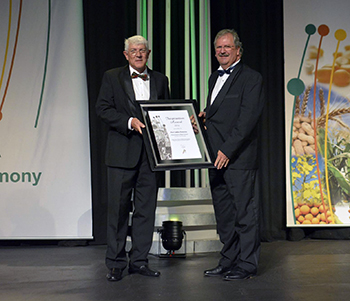Latest News Archive
Please select Category, Year, and then Month to display items
12 January 2024
|
Story Nonsindiswe Qwabe
|
Photo Sonia Small
 Since joining the UFS in 2008, Dr Grey Magaiza has worked extensively on approaches that can foster the socio-economic transformation of societies.
Since joining the UFS in 2008, Dr Grey Magaiza has worked extensively on approaches that can foster the socio-economic transformation of societies.
“The future should be one where communities can decide on their development agenda and futures. That’s the most important for me.” Dr Grey Magaiza, Deputy Director of the Centre for Gender and Africa Studies (CGAS) and Head of the Community Development programme on the Qwaqwa Campus, is passionate about capacitating communities to be agents of change and advancement. His vision for the future emphasises the empowerment of communities to take charge of their development by actively participating in decision making and the implementation of development projects that can improve their lives.
Since joining the UFS in 2008, Dr Magaiza has worked extensively on approaches that can foster the socio-economic transformation of societies. Over the years, he has crafted his research speciality into one that he is most proud of – being an interdisciplinary scientist immersed in the development of communities.
“I’m in a fortunate position of researching what I like. I say ‘fortunate’, because I’ve taken the time to understand what I’m passionate about, which is the overall field of rural livelihoods and livelihood futures – in short, community development. My research starts from an engaged university, understanding the elements that a university must use to enhance transformation and relevance to its immediate community in terms of development.”
One of the ways he has done this is by looking at social entrepreneurship as a development approach for young people in a rural setting. Through workshops with non-profit and civic organisations in Qwaqwa, Dr Magaiza has been helping these organisations to map out their needs and actively meet them through the involvement and support of external role players.
“We understand that communities are part of the national development agenda, but even that national agenda respects community knowledge and intentions and allows communities to shape their identity. A critical enabler of this is community organising. You bring back the capacity in communities to have dialogues on issues affecting them as spaces for engagement, knowledge exchange, and for people to just talk about their way forward.”
By enabling communities to define their development agenda, they can address their specific needs, challenges, and aspirations, he said. “When I look at livelihood futures, it’s quite an exciting aspect of my work – it’s like looking into a fortune tellers’ globe, because you’re not deciding for communities what they should do, but the communities themselves take those decisions.”
Plant researcher receives prestigious Grain SA award
2016-10-21

Prof Zakkie Pretorius from the UFS Department
of Plant Sciences with Andries Theron,
vice-chairman of Grain SA. Theron presented
the award to Prof Pretorius at Grain SA’s a
nnual gala event, which was held in Midrand
this year.
Photo (read more): Supplied
Photo (spotlight): Charl Devenish
A researcher in the Department of Plant Sciences at the University of the Free State (UFS), Prof Zakkie Pretorius, received the prestigious Grain Producer of the Year Inspiration Award during the annual gala event of Grain SA. Grain SA provides strategic commodity support and services to South African grain producers to assist in the sustainability of the sector.
This award is presented to individuals or organisations in appreciation of excellent contributions to the grain industry. These individuals have also achieved extraordinary results in their respective fields.
Research in the interest of food security
Prof Pretorius has been involved in research on plant diseases and food crops for the past 38 years. His research focus, rust diseases in crops, is especially important for food security.
According to Prof Pretorius, who collaborates with an extensive network of specialist colleagues, his research covers a variety of topics including rust race identification, the discovery of new resistance genes, characterisation of resistance expression in plants, and the mapping of genes. His focus is not only on wheat, but he also researches rust diseases in oats, barley, maize, dry beans, lentils, sunflowers, and soybeans.
Breeding of rust-resistant varieties gains scientific basis
Locally, he has been contracted for several years by the Winter Grain Trust to annually evaluate commercial wheat cultivars and elite germplasm. This information is regularly passed on to the relevant seed companies and breeders, and is also included in the production guidelines of the Agricultural Research Council for disease risk assessment. His research places the breeding and selection of rust-resistant varieties on a solid scientific foundation. A living collection of rust fungus cultures and a large germplasm collection are maintained at the UFS under his supervision.